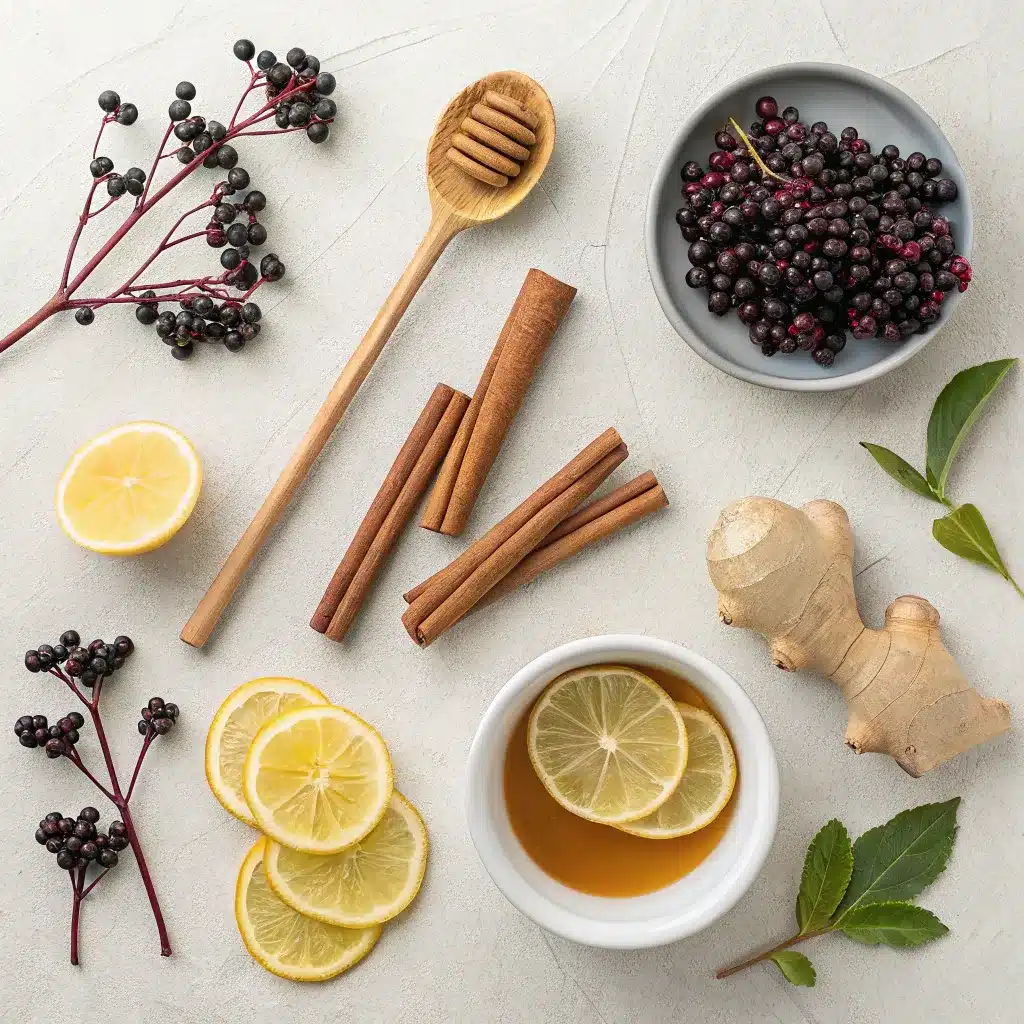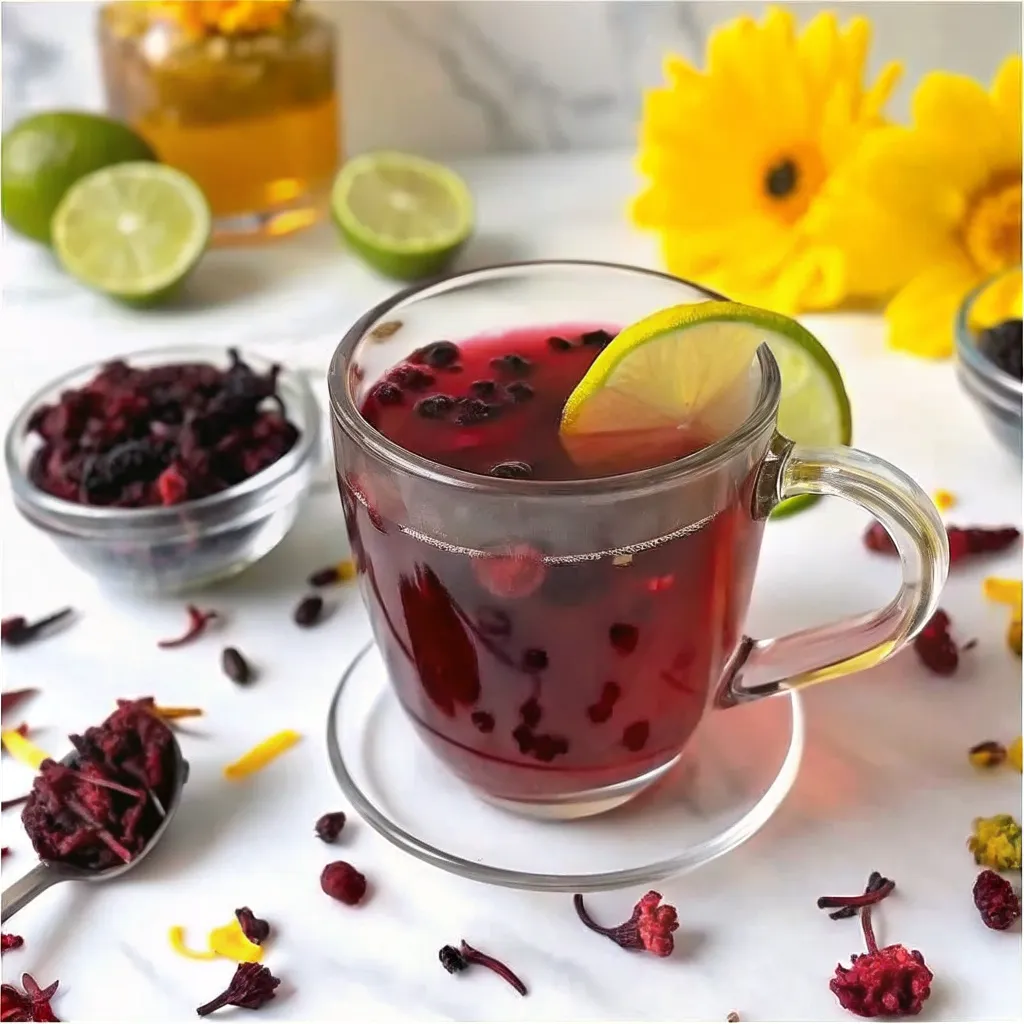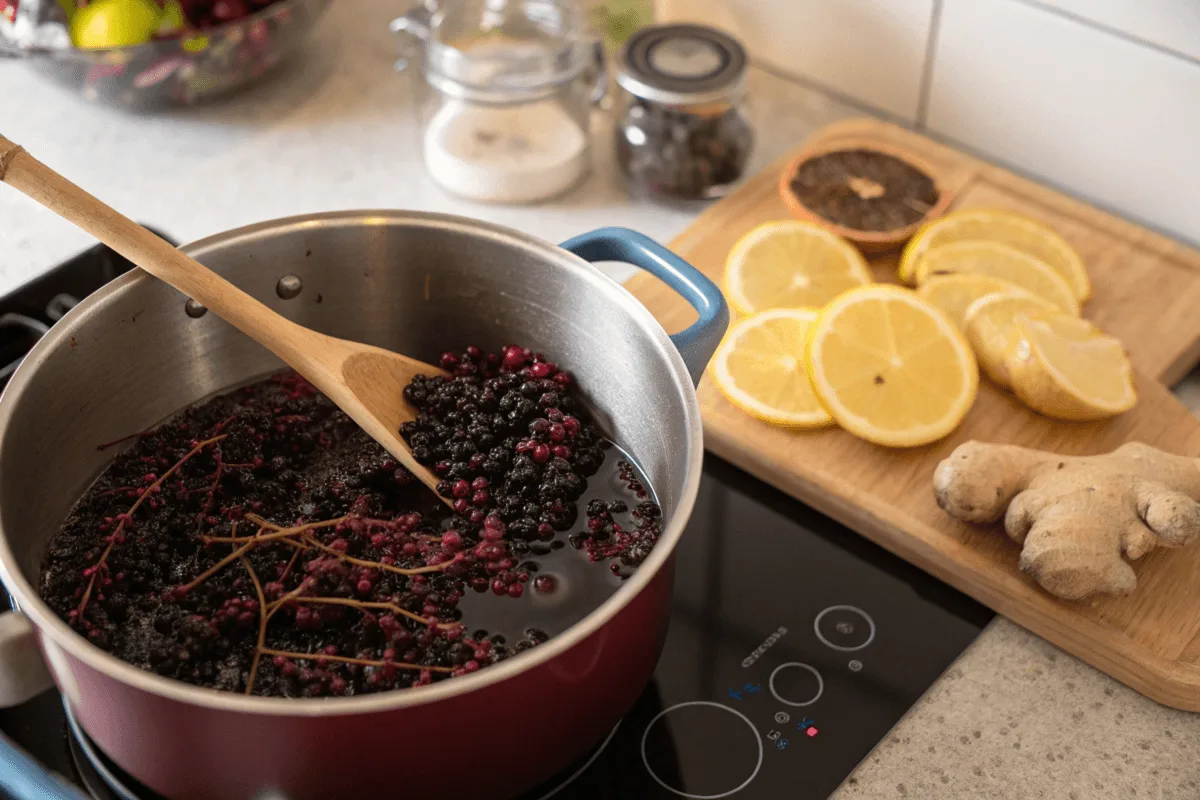Elderberry tea has long held a place in my kitchen—and my heart. At Giddy Recipes, I’m all about making delicious food and drink approachable, functional, and full of life. I’m John, a trained chef from Alabama, and I’ve always believed in the power of natural ingredients. Elderberries first entered my world through a homemade syrup my grandmother used to brew every winter. Years later, I adapted that memory into a tea ritual that supports my health and satisfies my taste buds.
Elderberry tea isn’t just a seasonal fix—it’s a daily habit I reach for, whether I’m feeling under the weather or simply craving something warm, rich, and full of goodness. What started as an experiment to reduce store-bought remedies turned into a full-fledged staple in my wellness toolkit. With just dried elderberries and water, I could recreate that comforting scent from my childhood—only now with the added benefits of science-backed immune support.
Elderberry tea stands out because it’s more than a drink. It’s tradition, healing, and flavor wrapped into one mug. As someone who also loves a good chai latte or matcha protein drink, I found elderberry tea offered something even more grounding—a connection to heritage and holistic health.
In this article, you’ll discover what makes elderberry tea so special, how to brew it perfectly, ways to mix it up with other herbs, and everything you need to know to make it a joyful part of your day. Whether you’re brand new to herbal teas or already love our kinds of tea guide, you’re in for a flavorful and nourishing ride.
The Health Benefits of Elderberry Tea
Nutritional Powerhouse in Every Cup
Elderberry tea is more than a warm, comforting beverage—it’s packed with nutrients that support overall health. Elderberry tea contains high levels of vitamin C, which plays a crucial role in immune defense and skin health. A single cup delivers a natural dose of antioxidants, helping your body fight off oxidative stress.
Elderberry tea is also a great source of vitamin A, iron, and potassium. These nutrients contribute to better vision, red blood cell production, and regulated blood pressure. The deep purple color of the berries comes from anthocyanins—plant-based compounds known for their anti-inflammatory and heart-protective effects.
Elderberry tea provides a gentle daily boost without caffeine, making it a go-to option for wellness enthusiasts who want to cut down on stimulants. Unlike heavily processed drinks, this tea is free from additives and can easily be sweetened with natural options like honey or stevia for an extra nutritional lift.
For more naturally nutrient-rich recipes, check out our white fruits health benefits or learn how arrowroot powder supports gut and skin wellness.
Natural Immunity and Inflammation Support
Elderberry tea is best known for its immune-supporting properties. It’s a favorite remedy during cold and flu season, and for good reason. The berries contain powerful flavonoids that have been shown to help reduce the duration and severity of upper respiratory infections.
Elderberry tea can also soothe sore throats and calm inflammation. Thanks to its high anthocyanin content, it helps lower inflammation levels in the body—great for those with seasonal allergies, joint discomfort, or general immune imbalance.
Elderberry tea isn’t just reactive—it’s preventative. Many drink it daily to build resilience over time. Combined with a healthy diet and other herbal allies like ginger or hibiscus, this tea becomes a natural shield for your body.
To maximize seasonal wellness, try pairing elderberry tea with our pumpkin spice chai latte—a spicy, antioxidant-rich drink that complements its benefits beautifully.
How to Make Elderberry Tea at Home
Simple Elderberry Recipe Anyone Can Brew

Making your own herbal infusion from elderberries is surprisingly simple, even for beginners. All you need is a tablespoon of dried fruit, two cups of water, and a few optional ingredients for added flavor.
Start by combining the dried berries with water in a saucepan. Bring it to a boil, then reduce the heat and allow it to simmer for 10 to 15 minutes. This process draws out the antioxidants and rich flavor.
Once done, strain the liquid through a fine mesh sieve to remove solids. What remains is a warm, slightly tart brew with a beautiful purple hue. Sweeten it naturally with honey or brighten it with lemon. For a cozy aroma, cinnamon sticks or cloves can be simmered with the mixture.
While it’s commonly enjoyed hot, this brew also tastes great chilled. Store it in the fridge, then pour it over ice with a splash of lime or stevia for a refreshing twist.
This herbal drink pairs perfectly with something sweet from our decadent dessert bar recipes—a balanced moment of indulgence.
Add Flavor with Herbs and Spices
Enhance your elderberry-based brew by experimenting with herbal combinations. A classic pairing is ginger, which adds a warming, spicy note and boosts its anti-inflammatory benefits. Just add fresh ginger slices while it simmers.
Hibiscus is another excellent companion. It intensifies the color and introduces a tangy floral layer. Add a teaspoon of dried hibiscus in the last few minutes of cooking for a refreshing variation.
Other great add-ins include chamomile for calm, echinacea for added immune support, and spices like cinnamon or cardamom for a comforting twist. You’ll find even more inspiration in our balsam pear and mulberry leaf tea blend.
This drink is flexible and inviting, allowing you to personalize every cup to your taste or health goals.
How to Source Elderberry Tea and Drink It Safely
Choosing the Best Elderberry Tea

Elderberry tea is easy to find in health food stores, specialty tea shops, and online retailers. Whether you’re buying pre-packaged tea bags or loose dried berries, quality matters. Always look for organic, non-GMO, or sustainably harvested elderberries to ensure you’re getting a clean, potent product.
Elderberry tea should list elderberries as the first ingredient with no unnecessary fillers or artificial flavors. Many reputable brands also combine elderberries with herbs like echinacea or hibiscus for enhanced immune support. Just make sure the blends don’t include added sugars if you’re drinking for health.
Elderberry tea is often available from trusted sources like Traditional Medicinals, Yogi, or local herbalists who dry berries in small batches. For a fully personalized brew, purchase dried elderberries and create your own blends at home, allowing you full control over taste and strength.
Explore similar wellness options with our kinds of tea guide, where you’ll discover more ways to find the perfect cup.
Safe Use, Side Effects, and Who Should Avoid It
Elderberry tea is generally safe when prepared correctly—but raw elderberries, leaves, or stems can be toxic. Always use dried or cooked elderberries from a reputable source. Proper heat neutralizes any natural compounds that may upset the digestive system.
Elderberry tea should be consumed in moderation. One to two cups per day is ideal for general wellness. Drinking more than three servings a day may cause mild digestive symptoms like nausea or bloating in sensitive individuals.
Elderberry tea may not be appropriate for everyone. If you’re pregnant, breastfeeding, immunocompromised, or taking medications, consult your doctor before adding it to your routine. The same goes for young children—speak with a pediatrician before sharing your tea.
Elderberry tea fits beautifully into a seasonal wellness plan but should always be used with awareness. Like any natural remedy, it’s about balance and consistency.
To further explore ingredients that support immunity and digestion, check out our guide on arrowroot powder benefits, another plant-based ally for everyday health.
Frequently Asked Questions (FAQs)
What are the benefits of elderberry tea?
Elderberry tea is rich in antioxidants, especially vitamin C and anthocyanins. It supports the immune system, reduces inflammation, and may help ease cold and flu symptoms. It also offers cardiovascular and skin health benefits when consumed regularly.
Is elderberry tea safe to drink every day?
Yes, elderberry tea is safe to drink daily for most people. One or two cups a day can support wellness, especially during cold and flu season. Just make sure it’s made from properly dried or cooked elderberries to avoid toxicity.
What are the side effects of elderberry tea?
In rare cases, overconsumption or using improperly prepared berries can cause nausea, stomach upset, or diarrhea. To avoid this, always use dried elderberries from a reputable source and stick to moderate servings.
Who should not take elderberry tea?
People who are pregnant, breastfeeding, immunocompromised, or taking immune-modulating medications should consult a doctor before drinking elderberry tea. It’s also best to speak to a pediatrician before giving it to young children.
Conclusion and Final Thoughts
Elderberry tea is one of those rare remedies that blend tradition, flavor, and wellness in a single cup. It’s warm, fruity, and soothing—and with every sip, you’re giving your body a gentle nudge toward better health.
Whether you’re looking to strengthen your immune system, soothe a sore throat, or simply enjoy a cozy, caffeine-free beverage, elderberry tea delivers. I’ve made it part of my daily wellness routine, and I always recommend it to friends and family looking for a natural way to feel their best.
So go ahead—brew yourself a pot, experiment with herbs and spices, and enjoy the rich benefits of this centuries-old elixir. It’s a small ritual with powerful results.
For more tea inspiration, explore our chai latte guide or pair your next cup with one of our decadent dessert bar creations.


2 thoughts on “Elderberry Tea Benefits Recipes: A Natural Immune-Boosting Drink”